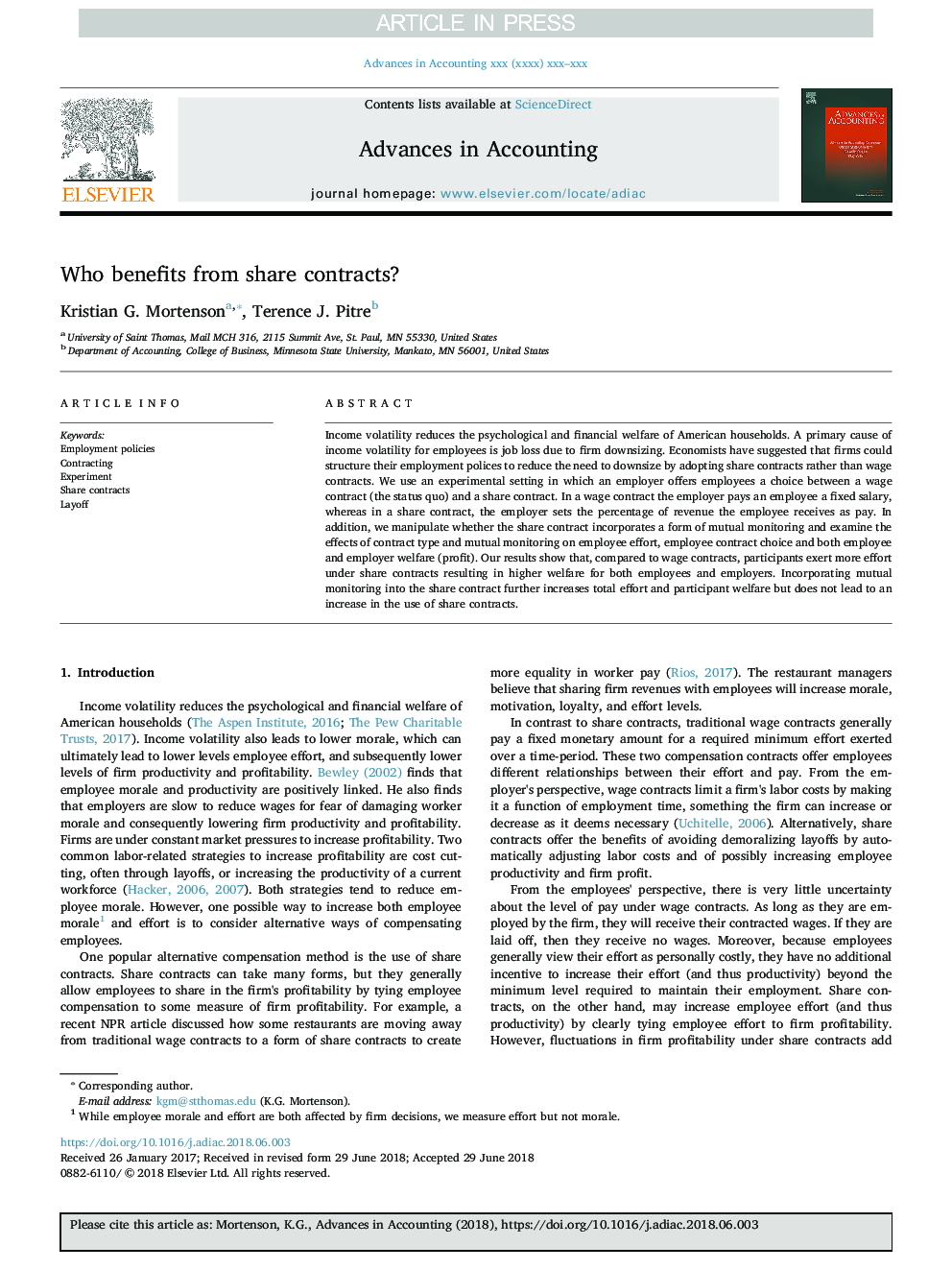| کد مقاله | کد نشریه | سال انتشار | مقاله انگلیسی | نسخه تمام متن |
|---|---|---|---|---|
| 8960796 | 1646434 | 2018 | 11 صفحه PDF | دانلود رایگان |
عنوان انگلیسی مقاله ISI
Who benefits from share contracts?
ترجمه فارسی عنوان
چه کسی از قراردادهای اشتراکی سود می برد؟
دانلود مقاله + سفارش ترجمه
دانلود مقاله ISI انگلیسی
رایگان برای ایرانیان
کلمات کلیدی
سیاست های استخدامی، قرارداد، آزمایشی قرارداد اشتراکی، لایحه
ترجمه چکیده
نوسانات درآمد، رفاه روحی و مالی خانواده های آمریکایی را کاهش می دهد. یکی از دلایل اصلی بی ثباتی درآمد برای کارکنان، کاهش شغل به دلیل کاهش شرکت است. اقتصاددانان پیشنهاد کرده اند که شرکت ها می توانند سیاست های استخدامی خود را برای کاهش نیاز به کاهش، با تصویب قراردادهای به جای قراردادهای دستمزد، ساختار دهند. ما از یک محیط آزمایشی استفاده می کنیم که در آن یک کارفرما، کارکنان را انتخاب می کند که بین یک قرارداد دستمزد (وضعیت وضعیت) و یک قرارداد مشترک است. در یک قرارداد دستمزد، کارفرما یک وام ثابت را به یک کارمند پرداخت می کند، در حالی که در یک قرارداد اشتراکی، کارفرما درصد درآمد کارمند را به عنوان پرداخت می کند. علاوه بر این، ما دستکاری می کنیم که آیا قرارداد مشترک شامل یک نوع نظارت متقابل و بررسی تأثیر نوع قرارداد و نظارت متقابل در تلاش کارکنان، انتخاب قرارداد کارکنان و رفاه کارکنان و کارفرمایان (سود) است. نتایج ما نشان می دهد که در مقایسه با قراردادهای حقوق و دستمزد، شرکت کنندگان تلاش بیشتری را در زمینه قراردادهای اشتراکی انجام می دهند که منجر به رفاه بیشتر برای کارمندان و کارفرمایان می شود. پیوستن نظارت متقابل به قرارداد اشتراکی، باعث افزایش کل تلاش و رفاه شرکت کنندگان می شود، اما منجر به افزایش استفاده از قراردادهای سهام نمی شود.
موضوعات مرتبط
علوم انسانی و اجتماعی
مدیریت، کسب و کار و حسابداری
حسابداری
چکیده انگلیسی
Income volatility reduces the psychological and financial welfare of American households. A primary cause of income volatility for employees is job loss due to firm downsizing. Economists have suggested that firms could structure their employment polices to reduce the need to downsize by adopting share contracts rather than wage contracts. We use an experimental setting in which an employer offers employees a choice between a wage contract (the status quo) and a share contract. In a wage contract the employer pays an employee a fixed salary, whereas in a share contract, the employer sets the percentage of revenue the employee receives as pay. In addition, we manipulate whether the share contract incorporates a form of mutual monitoring and examine the effects of contract type and mutual monitoring on employee effort, employee contract choice and both employee and employer welfare (profit). Our results show that, compared to wage contracts, participants exert more effort under share contracts resulting in higher welfare for both employees and employers. Incorporating mutual monitoring into the share contract further increases total effort and participant welfare but does not lead to an increase in the use of share contracts.
ناشر
Database: Elsevier - ScienceDirect (ساینس دایرکت)
Journal: Advances in Accounting - Volume 42, September 2018, Pages 125-135
Journal: Advances in Accounting - Volume 42, September 2018, Pages 125-135
نویسندگان
Kristian G. Mortenson, Terence J. Pitre,
